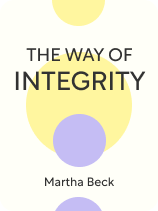

This article is an excerpt from the Shortform book guide to "The Way of Integrity" by Martha Beck. Shortform has the world's best summaries and analyses of books you should be reading.
Like this article? Sign up for a free trial here.
How can you embrace and foster positive change in your life? What should you expect in your journey of transformation?
When you commit yourself to a life of integrity, you’ll change. Martha Beck shares four ways to leverage that transformation for maximum impact: embrace the unknown, embrace unity and connectedness, find a higher purpose, and spread alignment (integrity) to others.
Read more to understand these aspects of personal change management and learn how to put them to work in your life.
Personal Change Management
Beck argues that, as you practice integrity, you might find yourself changing in ways that you didn’t expect. Your nature may call you to a higher sense of purpose and a higher spiritual awareness of the world around you. Beck calls on you to trust your process and embrace this transformation, even though its outcomes may be uncertain. She gives four pieces of advice for personal change management.
1) Embrace the Unknown
Beck encourages you to allow yourself to be open to aspects of life and experience that you don’t fully understand. She argues that living in alignment with your true nature won’t simply help you become healthier and happier—it may also lead you to a higher spiritual awareness. This will require an openness to unknown experiences because the spiritual aspects of your life and world may be unfamiliar and unknown to you, especially if you have been living in misalignment. Just because you don’t fully know what you are experiencing doesn’t mean you can’t continue trusting the process and being receptive to new spiritual experiences.
| What Is “Spirituality?” Beck argues that the path of integrity leads not simply to better psychological health and well-being, but also to a greater state of spiritual enlightenment. However, the term “spiritual” can mean very different things depending on the context. Reviewing a few common understandings of the term will shed light on Beck’s ideas. • The term “spiritual” comes from the Latin spiritus, originally meaning “breath” or “wind.” To this day, the term carries a sense of both “life force” and “non-materiality” that hearken back to these roots. • Some define spirituality as a set of emotional experiences, particularly a sense of awe, wonder, acceptance, and inner peace. • Others define spirituality as a sense of greater connection, either to the world around us, to a higher power, or to something greater than ourselves. • Finally, others define spirituality as an experience of deeper connection to one’s own sense of values and purpose—an experience of clarity about the source of one’s meaning in life. |
2) Embrace Unity and Connectedness
As you embrace your true nature and find yourself ascending to new levels of spiritual awareness, you will find the divisions between yourself and the rest of the universe becoming less important. Beck argues that interconnectedness is the true nature of the world and that we learn from culture to put boundaries between ourselves and the universe. Beck argues that, the more we get in touch with our true natures, the more we will experience belonging and connection as part of a vast, interconnected unity.
| Religious Teachings on Interconnectedness and Unity In arguing that higher spiritual awareness will lead to a greater sense of interconnectedness, Beck implicitly draws on a range of religious traditions that have proclaimed a “oneness” or “unity” of the world. • In the Tao Te Ching, Lao Tzu argues that the Tao is an eternal force manifest in all things, and that the highest spiritual state is to harmonize your life with the Tao. • Some Hindu traditions proclaim that there is a universal soul called atman, and that spiritual practice allows you to commune or fuse with this single universal soul. • The Buddhist concept of sunyata posits a philosophy of “non-dualism”—a rejection of distinctions between the objects or entities of the world in favor of a single, undifferentiated whole. |

———End of Preview———
Like what you just read? Read the rest of the world's best book summary and analysis of Martha Beck's "The Way of Integrity" at Shortform.
Here's what you'll find in our full The Way of Integrity summary:
- How to know if you're living in alignment with your true self
- How messages from our culture tell us to chase things we don't really want
- The four stages of realigning your life to find happiness






